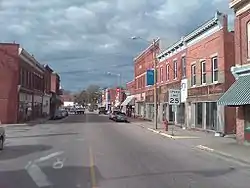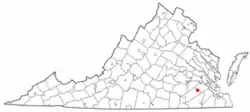Waverly, Virginia
Waverly is an incorporated town in Sussex County, Virginia, United States. Per the 2020 census, the population was 1,955.[4]
Waverly, Virginia | |
|---|---|
 Downtown Waverly | |
 Location of Waverly, Virginia | |
| Coordinates: 37°2′2″N 77°5′43″W | |
| Country | United States |
| State | Virginia |
| County | Sussex |
| Area | |
| • Total | 3.08 sq mi (7.99 km2) |
| • Land | 3.08 sq mi (7.99 km2) |
| • Water | 0.00 sq mi (0.00 km2) |
| Elevation | 112 ft (34 m) |
| Population (2020) | |
| • Total | 1,955 |
| • Density | 630/sq mi (240/km2) |
| Time zone | UTC−5 (Eastern (EST)) |
| • Summer (DST) | UTC−4 (EDT) |
| ZIP codes | 23890-23891 |
| Area code | 804 |
| FIPS code | 51-83600[2] |
| GNIS feature ID | 1500286[3] |
| Website | Official website |
History
Popular legend has it that William Mahone (1826–1895), builder of the Norfolk and Petersburg Railroad (now Norfolk Southern), and his cultured wife, Otelia Butler Mahone (1837–1911), traveled along the newly completed Norfolk and Petersburg Railroad naming stations. Otelia was reading Ivanhoe, a book written by Sir Walter Scott. From his historical Scottish novels, Otelia chose the place names of Waverly, as well as Windsor and Wakefield. She tapped the Scottish Clan "McIvor" for the name of Ivor, a small town in neighboring Southampton County. When they could not agree, it is said that they invented a new name in honor of their dispute, which is how the tiny community of Disputanta a few miles west of Waverly was named. The N&P railroad was completed in 1858.
William Mahone became a Major General in the Confederate Army during the American Civil War, and later, a Senator in the United States Congress. A large portion of U.S. Route 460 between Petersburg and Suffolk is named in his honor.
Waverly is the second largest of the towns Gen. Mahone founded. Waverly has supplied the most state senators and delegate members to the Virginia General Assembly of any Virginia town under 3,000 people. They are Junius Edgar West, Delegate (1910–1912) and Senator (1912–1918); Thomas H. Howerton, Delegate (1912–1914); William O. Rogers, Senator (1924–1934); Garland "Peck" Gray, Senator (1942–1945 and 1948–1971); and Elmon T. Gray, Senator (1971–1992).
The Miles B. Carpenter House, Hunting Quarter, and Waverly Downtown Historic District are listed on the National Register of Historic Places.[5]
One of the last lynchings in Virginia happened in Waverly in 1925, when a black man was arrested for allegedly attacking a married white woman and stealing a pistol belonging to her husband. An armed mob of approximately 500 descended on the jail, seized the man, and then strung him up a tree, shot him, and burned him.[6] The following day, Governor E. Lee Trinkle arrived in Waverly and admonished citizens.[6] Negative publicity surrounding the event and the lynching of another black man in Wytheville, Virginia in 1926, led to anti-lynching legislation.[7]
On February 24, 2016, an EF1 tornado moved directly through Waverly, killing three, as verified by the Virginia Department of Game and Inland Fisheries. The storm also caused significant damage to the town, destroying mobile homes, and damaging homes, businesses, trees, and power poles and lines.[8][9] This was all part of a massive storm system that moved rapidly across the region.[10]
Geography
According to the United States Census Bureau, the town has a total area of 3.1 square miles (8.0 km2), all of it land.
Demographics
| Census | Pop. | Note | %± |
|---|---|---|---|
| 1880 | 170 | — | |
| 1900 | 493 | — | |
| 1910 | 1,064 | 115.8% | |
| 1920 | 1,306 | 22.7% | |
| 1930 | 1,355 | 3.8% | |
| 1940 | 1,288 | −4.9% | |
| 1950 | 1,502 | 16.6% | |
| 1960 | 1,601 | 6.6% | |
| 1970 | 1,717 | 7.2% | |
| 1980 | 2,284 | 33.0% | |
| 1990 | 2,223 | −2.7% | |
| 2000 | 2,309 | 3.9% | |
| 2010 | 2,149 | −6.9% | |
| 2020 | 1,955 | −9.0% | |
| U.S. Decennial Census[11] 2010[12] 2020[13] | |||
2020 census
| Race / Ethnicity | Pop 2010[12] | Pop 2020[13] | % 2010 | % 2020 |
|---|---|---|---|---|
| White alone (NH) | 640 | 524 | 29.78% | 26.80% |
| Black or African American alone (NH) | 1,390 | 1,310 | 64.68% | 67.01% |
| Native American or Alaska Native alone (NH) | 1 | 5 | 0.05% | 0.26% |
| Asian alone (NH) | 11 | 0 | 0.51% | 0.00% |
| Pacific Islander alone (NH) | 0 | 4 | 0.00% | 0.20% |
| Some Other Race alone (NH) | 1 | 5 | 0.05% | 0.26% |
| Mixed Race/Multi-Racial (NH) | 23 | 55 | 1.07% | 2.81% |
| Hispanic or Latino (any race) | 83 | 52 | 3.86% | 2.66% |
| Total | 2,149 | 1,955 | 100.00% | 100.00% |
2010 Census
As of the 2010 United States Census, there were 2,149 people living in the town. The racial makeup of the town was 64.7% Black, 29.8% White, 0.0% Native American, 0.5% Asian, 0.0% from some other race and 1.1% from two or more races. 3.9% were Hispanic or Latino of any race.
As of the census[2] of 2000, there were 2,309 people, 880 households, and 570 families living in the town. The population density was 752.6 people per square mile (290.4/km2). There were 960 housing units at an average density of 312.9 per square mile (120.7/km2). The racial makeup of the town was 36.73% White, 61.76% African American, 0.13% Native American, 0.04% Asian, 0.48% from other races, and 0.87% from two or more races. Hispanic or Latino of any race were 1.17% of the population.
There were 880 households, out of which 29.8% had children under the age of 18 living with them, 40.1% were married couples living together, 20.7% had a female householder with no husband present, and 35.2% were non-families. 31.0% of all households were made up of individuals, and 12.7% had someone living alone who was 65 years of age or older. The average household size was 2.47 and the average family size was 3.09.
In the town, the population was spread out, with 25.4% under the age of 18, 6.0% from 18 to 24, 26.6% from 25 to 44, 23.4% from 45 to 64, and 18.6% who were 65 years of age or older. The median age was 40 years. For every 100 females, there were 88.2 males. For every 100 females age 18 and over, there were 80.4 males.
The median income for a household in the town was $33,698, and the median income for a family was $39,792. Males had a median income of $27,414 versus $21,279 for females. The per capita income for the town was $14,848. About 11.7% of families and 15.7% of the population were below the poverty line, including 21.4% of those under age 18 and 17.7% of those age 65 or over.
Notable people
- Garland Gray (1902 - 1977), banker, farmer, and sawmill owner who served in the Virginia Senate from 1940s until the 1970s.
- Elmon T. Gray (1925 - 2011), lumberman, real estate developer, and philanthropist who served in the Virginia Senate from the 1970s to the 1990s.
- Shirley MacLaine, lived here as a young child when her father, Ira Beaty, was briefly the local school's principal.[14]
- Warren Beatty, lived here a young child when his father, Ira Beaty, was briefly the local school's principal.
- Miles B. Carpenter, Noted American folk artist.
See also
References
- "2019 U.S. Gazetteer Files". United States Census Bureau. Retrieved August 7, 2020.
- "U.S. Census website". United States Census Bureau. Retrieved January 31, 2008.
- "US Board on Geographic Names". United States Geological Survey. October 25, 2007. Retrieved January 31, 2008.
- "Waverley town, Virginia". United States Census Bureau. Retrieved December 25, 2022.
- "National Register Information System". National Register of Historic Places. National Park Service. July 9, 2010.
- "Memories of 1925 lynching linger in Waverly".
- "Anti-Lynching Law of 1928 – Encyclopedia Virginia".
- Virginia Event Report: EF1 Tornado (Report). National Centers for Environmental Information. National Weather Service Weather Forecast Office in Wakefield, Virginia. 2016. Retrieved May 29, 2016.
- Virginia Event Report: EF1 Tornado (Report). National Centers for Environmental Information. National Weather Service Weather Forecast Office in Wakefield, Virginia. 2016. Retrieved May 29, 2016.
- Staff, Web (February 24, 2016). "3 killed, significant damage seen after reported tornado hits Waverly". WTVR. Tribune Broadcasting. Retrieved February 24, 2016.
- "Decennial Census by Decade". US Census Bureau.
- "P2 HISPANIC OR LATINO, AND NOT HISPANIC OR LATINO BY RACE - 2010: DEC Redistricting Data (PL 94-171) - Waverly town, Virginia". United States Census Bureau.
- "P2 HISPANIC OR LATINO, AND NOT HISPANIC OR LATINO BY RACE - 2020: DEC Redistricting Data (PL 94-171) - Waverly town, Virginia". United States Census Bureau.
- "Shirley MacLaine". Yahoo Movies. Retrieved February 25, 2016.
